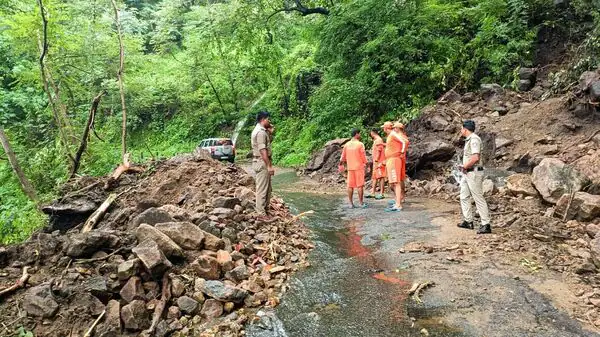Context:
Recently, the Wayanad district in Kerala saw massive landslides leading to loss of life and property.
More on the News:
- These catastrophic events buried large areas under debris, resulting in the tragic loss of at least 84 lives and leaving many injured.
- On July 23, an early warning indicated that Kerala would receive heavy rainfall in the western coastal area, and on July 25, the warning was updated to “very heavy” rainfall.
- A document presented in Parliament in July 2022 revealed that between 2017 and 2022, Kerala experienced 2,239 landslides, accounting for over 59 percent of all landslides in India during that period.
Ignored Warnings and Unchecked Development:
- As the chairman of the Western Ghats Ecology Expert Panel (WGEEP), the renowned ecologist Madhav Gadgil attributed the disaster to the state’s disregard for crucial ecological recommendations.
- Gadgil noted that the affected areas were designated as “no-development zones” due to their high ecological sensitivity.
- These areas, once used for tea plantations during the British era, have since undergone extensive development, including resorts and artificial lakes, which should have been prohibited.
- The area’s vulnerability was increased by nearby quarries. Although now defunct, their past operations could have contributed to the landslides, especially during heavy rainfall.
Western Ghats Ecology Expert Panel (WGEEP) Report
- The Western Ghats Ecology Expert Panel (WGEEP), chaired by renowned ecologist Madhav Gadgil, submitted a comprehensive report in 2011 on the ecological status of the Western Ghats and recommended measures for its conservation and sustainable development.
Key Findings and Recommendations:
- Ecological Sensitivity Zones: The report categorized the Western Ghats into three zones based on ecological sensitivity:
- Ecologically Sensitive Zone 1 (ESZ 1): Areas with very high ecological sensitivity.
- Ecologically Sensitive Zone 2 (ESZ 2): Areas with high ecological sensitivity.
- Ecologically Sensitive Zone 3 (ESZ 3): Areas with moderate ecological sensitivity.
- Development Restrictions: The report recommended stringent restrictions on development activities in ESZ 1 and ESZ 2, including a ban on new dams, mining, and large-scale infrastructure projects.
- People’s Participation: Emphasized the importance of involving local communities in conservation efforts through Gram Sabhas (village assemblies).
- Western Ghats Ecology Authority: Proposed the establishment of a dedicated authority for the management and conservation of the Western Ghats.
Why Are Landslides a Recurring Phenomenon in Kerala?
- Geographical Factors: Kerala’s geography, with its slopes and varied terrain, makes it prone to landslides. Landslides are more likely to occur on slopes exceeding 20 degrees, which is common in the Western Ghats.
- Climate and Environmental Factors: Increased rainfall due to climate change leads to soil saturation and instability. Kerala experiences abnormal heat and rainfall, with projections indicating increased temperatures and rainfall across all districts.
These geological features contribute to landslide susceptibility, particularly when combined with heavy rain. - Human Activities: Human activities such as mining, quarrying, deforestation, construction, etc, exacerbate landslide risks.
- Lack of Research and Observations: Excessive rain can trigger landslides even on slopes as gentle as 10-15 degrees. India lacks predictive maps for landslide flow routes, unlike countries like Switzerland.
Solutions and Recommendations
- Preparedness and Prevention: Emphasis on proactive measures, including coordination among geology, engineering, revenue, and agriculture departments.
- Tailored Environmental Policies: Design policies based on factors like elevation, soil type, and watershed characteristics.
- Risk Categorization: Conduct detailed surveys to classify areas by risk, free from external pressures.
- Precautionary and Polluter Pays Principles: Guidance from these principles, as recognised by the Supreme Court of India.
- Proactive vs. Reactive Approach: Stress the importance of proactive measures, including public access to information and special laws for hilly areas.

